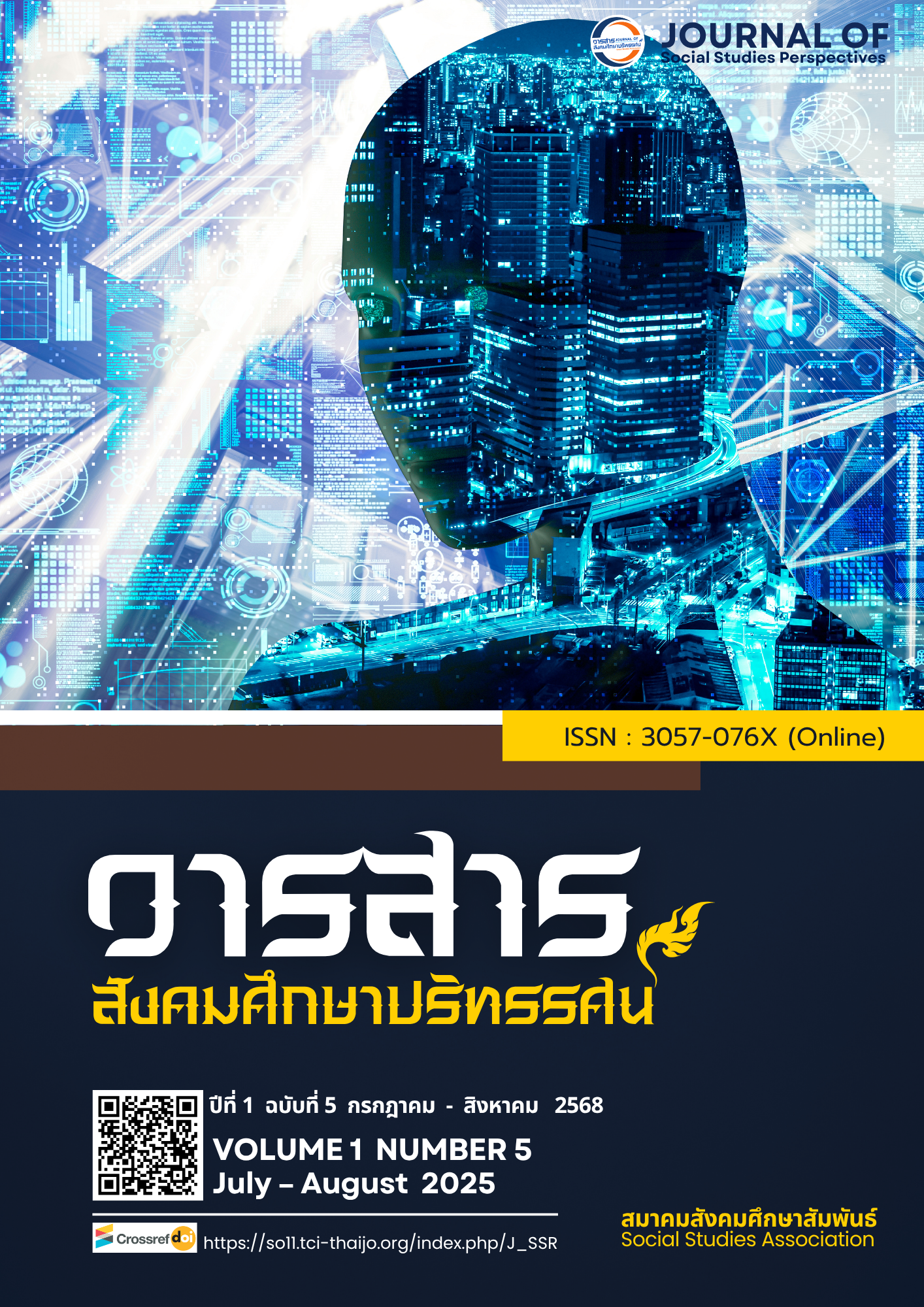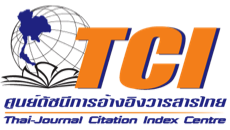บทบาทของนโยบายสาธารณะในการลดความเหลื่อมล้ำทางเศรษฐกิจในสังคมไทย
DOI:
https://doi.org/10.64186/jsp2391คำสำคัญ:
นโยบายสาธารณะ, ความเหลื่อมล้ำทางเศรษฐกิจ, ความยุติธรรมเชิงกระจาย, รัฐสวัสดิการ, การวิเคราะห์เอกสารบทคัดย่อ
บทความวิจัยนี้มีวัตถุประสงค์ 1) ศึกษาพัฒนาการและแนวโน้มของนโยบายสาธารณะที่มีเป้าหมายในการลดความเหลื่อมล้ำทางเศรษฐกิจในประเทศไทย 2) วิเคราะห์บทบาทและประสิทธิภาพของนโยบายสาธารณะในการจัดการกับความเหลื่อมล้ำทางเศรษฐกิจในมิติต่าง ๆ 3) เสนอแนวทางในการพัฒนานโยบายสาธารณะที่มีความยั่งยืนและสามารถลดความเหลื่อมล้ำทางเศรษฐกิจได้อย่างเป็นรูปธรรม เป็นการวิจัยเชิงคุณภาพ ได้ศึกษาแนวคิด ความยุติธรรมเชิงกระจาย ของ Rawls และแนวคิดรัฐสวัสดิการ เป็นกรอบการวิจัย กลุ่มเป้าหมาย คือ เอกสารทางวิชาการ รายงานวิจัย และเอกสารนโยบายจากหน่วยงานรัฐ และองค์กรระหว่างประเทศ จำนวน 45 ฉบับ ใช้วิธีคัดเลือกแบบเจาะจง (Purposive Sampling) เครื่องมือที่ใช้ในการวิจัยมี 1 ชนิด คือ แนวทางการวิเคราะห์เอกสาร ซึ่งพัฒนาโดยอิงจากหลักการของ Bowen และ Yin วิเคราะห์ข้อมูลโดยใช้การวิเคราะห์เนื้อหา แล้วเขียนบรรยายเชิงพรรณนา ผลการวิจัยพบว่า 1) พัฒนาการของนโยบายสาธารณะในไทยมีลักษณะต่อเนื่องในเชิงมาตรการช่วยเหลือระยะสั้น แต่ยังขาดแนวทางเชิงโครงสร้างและขาดการบูรณาการเชิงยุทธศาสตร์ 2) นโยบายจำนวนมากมีบทบาทในระดับ บรรเทาความเดือดร้อน มากกว่าการลดช่องว่างเชิงระบบ ขาดกลไกติดตามประเมินผล และขาดการมีส่วนร่วมของภาคประชาชน และ 3) แนวทางในการพัฒนานโยบายควรมุ่งเน้นการออกแบบที่สอดคล้องกับบริบทท้องถิ่น มีความยืดหยุ่น และใช้ดัชนีความยุติธรรมในการประเมินผล มากกว่าการเน้นเพียงรายได้รวม สำหรับองค์ความรู้จากงานวิจัยนี้สามารถนำไปใช้ในการออกแบบนโยบายสาธารณะที่ตอบโจทย์กลุ่มเป้าหมายเฉพาะ เสริมประสิทธิภาพด้านการบริหาร และสนับสนุนการปฏิรูประบบรัฐสวัสดิการของไทยในระยะยาว
เอกสารอ้างอิง
Bowen, G. A. (2009). Document analysis as a qualitative research method. Qualitative
Research Journal, 9(2), 27–40.
Durongkaveroj, W. (2025). Tolerance for inequality in Thailand. Cogent Economics & Finance,
(1), Article 2461597.
Jenmana, T. (2018). Democratisation and the emergence of class conflict: Income inequality
in Thailand, 2001–2016 (WID.world Working Paper No. 2018/15). WID.world. Retrieved
March 25, 2024, from https://wid.world/document/extreme-inequality-democratisation-and-class-struggles-in-thailand
Meemon, N., Zhang, N. J., Wan, T. T. H., & Paek, S. C. (2022). Income inequality in Thailand: A
relative poverty approach. Asia Pacific Social Science Review, 22(3), 68–79.
National Economic and Social Development Council. (2024). NESDC economic
report. Retrieved July 1, 2024, from
https://www.nesdc.go.th/nesdb_en/article_attach/article_file_20240613100201.pdf
Shatnataphat, C. (2024). Inequality in Thai society: Challenges and adaptations toward
equality. Journal of Social Studies Perspectives, 1, 99–114.
Sitthiyot, T., & Holasut, K. (2024, February). Income distribution in Thailand is scale invariant
[Preprint]. arXiv. Retrieved March 25, 2024, from https://arxiv.org/abs/2402.01141
Sitthiyot, T., & Holasut, K. (2024, February). Quantifying fair income distribution in Thailand
[Preprint]. arXiv. Retrieved March 25, 2024, from https://arxiv.org/abs/2404.09629
Sorsa-ard, K., Khanthong, C., Khodchawong, N., Thongklom, O., & Srichuangchote, R. (2025).
The welfare needs of low-income elderly in Takram En Subdistrict Administrative
Organization, Kanchanaburi Province. Journal of Social Studies Perspectives, 1(2),
–74.
Sudswong, W., Plangprasopchok, A., & Amornbunchornvej, C. (2021). Occupational income
inequality of Thailand: A case study of exploratory data analysis beyond Gini
coefficient [Preprint]. arXiv. Retrieved March 25, 2024, from
https://arxiv.org/abs/2111.06224
Thailand Development Research Institute (TDRI). (2020). Thai inequality: What we should
know. Thailand Development Research Institute. Retrieved March 25, 2024, from
https://tdri.or.th/en/2020/01/thai-inequality-what-we-should-know
Warr, P., & Yusuf, A. A. (2025, April). Structural change and income inequality: Evidence from
Thailand (Working Paper No. 2025/062). Australian National University. Retrieved
March 25, 2024, from https://doi.org/10.2139/ssrn.4757493
World Bank. (2023). Bridging the gap: Inequality and jobs in Thailand (APSD Brief). World
Bank. Retrieved March 25, 2024, from
World Inequality Lab. (2019). Extreme inequality, democratisation and class struggles in
Thailand (Issue Brief 2019/1). WID.world. Retrieved March 25, 2024, from
https://wid.world/document/extreme-inequality-democratisation-and-class-struggles-in-thailand
Yin, R. K. (2016). Qualitative research from start to finish (2nd ed.). Guilford Press.
เผยแพร่แล้ว
รูปแบบการอ้างอิง
ฉบับ
ประเภทบทความ
หมวดหมู่
สัญญาอนุญาต
ลิขสิทธิ์ (c) 2025 วารสารสังคมศึกษาปริทรรศน์

อนุญาตภายใต้เงื่อนไข Creative Commons Attribution-NonCommercial-NoDerivatives 4.0 International License.
บทความนี้ได้รับการเผยแพร่ภายใต้สัญญาอนุญาต Creative Commons Attribution-NonCommercial-NoDerivatives 4.0 International (CC BY-NC-ND 4.0) ซึ่งอนุญาตให้ผู้อื่นสามารถแชร์บทความได้โดยให้เครดิตผู้เขียนและห้ามนำไปใช้เพื่อการค้าหรือดัดแปลง หากต้องการใช้งานซ้ำในลักษณะอื่น ๆ หรือการเผยแพร่ซ้ำ จำเป็นต้องได้รับอนุญาตจากวารสาร










